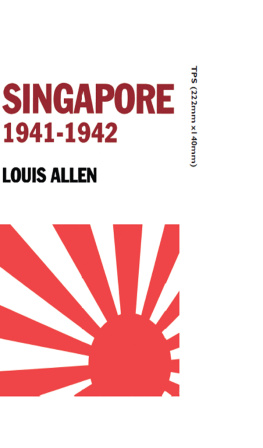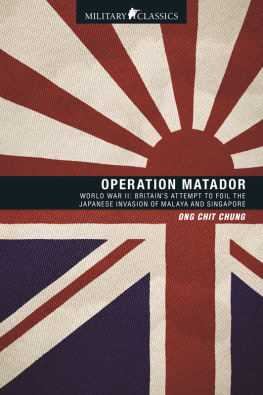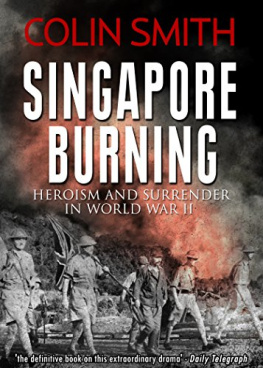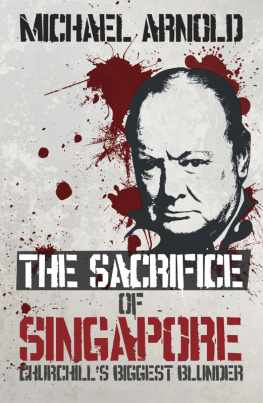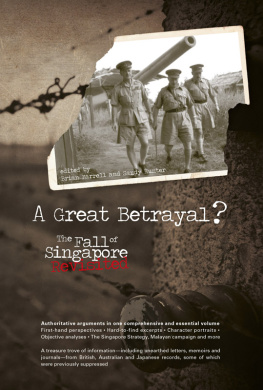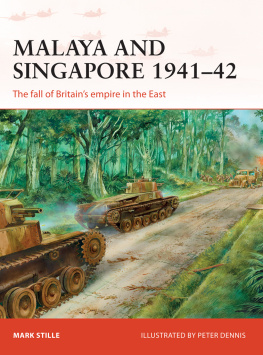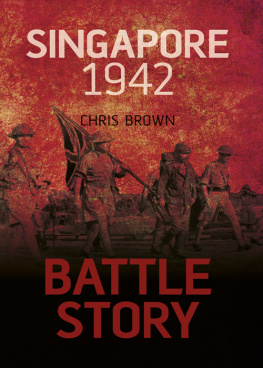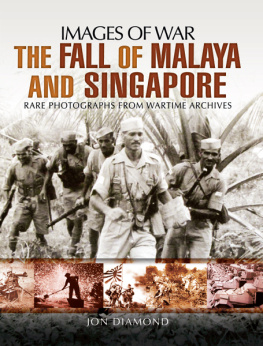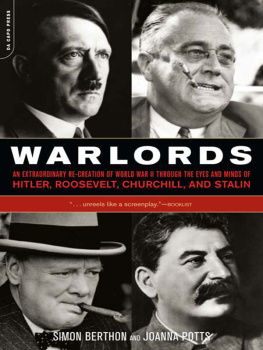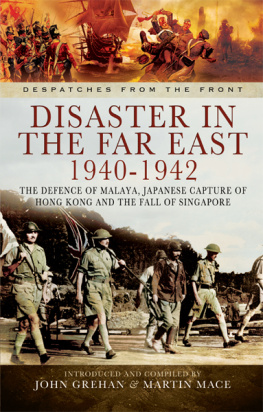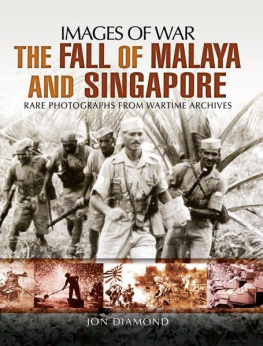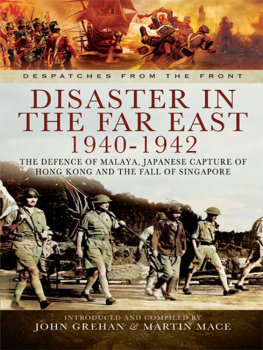First published in 1977 by
Davis-Poynter Limited, London
Reprinted 2005 by Frank Cass
2 Park Square, Milton Park,
Abingdon, Oxon, 0X14 4RN
Transferred to Digital Printing 2005
Frank Cass is an imprint of the Taylor & Francis Group
Printed and bound by Antony Rowe Ltd, Eastbourne
ISBN: 0-7146-8198-9
Copyright 1977, 1993 by Louis Alien
To Tim, Louise and Felix
British Library Cataloguing in Publication Data
Alien, Louis
Singapore, 1941-42.-2 Rev. ed
1.Title
940. 5425
ISBN: 0-7146-3473-5
ISBN: 978-1-135-19425-3 (ePub)
Library of Congress Cataloging-in-Publication Data
Alien, Louis
Singapore 1941-1942/Louis Alien
P.cm.
Includes bibliographical references and index
1. World War, 1939-1945-Campaigns-Singapore. 2 Singapore-History.3. World War, 1939-1945-Campaigns-Malaysia-Malaya. 4. Malaya-History.
l.Title
D767.55.A44 1993 92-20935
940.54'26-dc20
All Rights Reserved. No Part of this publication may be reproduced in any from or by any means, electronic, , mechanical, photocopying, recording or otherwise, without the prior permission of the publishers.
In reprinting the text of Singapore 1941421 have naturally taken the opportunity of correcting errata that slipped into the first printing. I have also taken the chance to write a new introduction, responding to the suggestions and queries readers sent to me after the book was published.
One example of a factual correction occurs on the first page. I followed the usual description of the British surrender of Singapore on 15 February 1942, propagated at the time by Japanese journalists, and accepted later by most historians, as an unconditional surrender. I have now deleted the adjective unconditional. It will be recalled that General Percival was given no copy of the surrender terms for his own retention; and as he had clearly insisted successfully on a number of conditions, it no doubt did not occur to him that the British defeat would go down in history as an unconditional surrender.
That the very term unconditional was never used in the negotiations by any of the participants was confirmed to me by General Sugita Ichiji, who, as the chief go-between (though not the official interpreter) between Yamashita and Percival, appears in all the photographs of the British party marching up the Bukit Timah Road to the Ford Factory, and those of the surrender parley inside the factory. General Sugitas English was (and is) good, he had lived for some time both in Britain and the USA, and his duties as a staff officer often brought him, after February 1942, in contact with the problems of the Japanese Army in South-East Asia.
In 1987, General Sugita published an autobiographical account of his years as an intelligence officer attached to Imperial General Headquarters, under the title Joho naki senso shido [War Leadership Without Intelligence] (Tokyo: Hara Shobo, 1987). In an appendix, he refers specifically to the Singapore surrender in these terms.
The accepted post-war view was that the British forces had surrendered unconditionally, as Singapore fell, but the phrase unconditional surrender did not appear in the surrender document and the provisions for treatment accompanying the surrender of the British Forces. Rather, it was stated that the officers and men surrendering would be treated according to the spirit of Bushido as in the main document.
It seems that a telegram was sent to Imperial General Headquarters saying the British forces have surrendered unconditionally, and this was investigated later among the staff officers of 25 Army, and was not acknowledged.
The author remained on the site of the parley between the two commanders and discussed the details with Captain Wild, a British staff officer, and since it was the middle of the night before he returned to [25] Army headquarters, he had no knowledge what kind of signal had been sent from Army to Imperial GHQ. Perhaps a staff officer sent from Imperial GHQ signalled unconditional surrender to Imperial GHQ. At the time, the war correspondents were flushed with victory, but Army HQ was relatively quiet. It was on that night of the discussion that the author sent a box of tinned foods to Captain Wild, as a consolatory gift, and he in turn gave the author his binoculars as a souvenir.
On the battlefield, there are things you encounter which are not taught in peacetime military academies. The treatment of surrender is one of these (p.406).
For the benefit of the people of Singapore, who were unlikely to come across his autobiography, General Sugita had clarified the issue two years before in an interview given to a Japanese-language newspaper in Singapore, The Pana Times (No. 31, 29 November 1985, p.7): the newspapers reported it at the time as unconditional surrender, and that is how it has entered Japanese histories of the war, but I never, myself, at that time, uttered the phrase unconditional surrender nor did General Yamashita.
In the end, given the overwhelming triumph of Japanese force, and the subsequent treatment of prisoners of war and internees, the issue may seem irrelevant. But it is not so for the historical record, or for Percivals reputation.
On page 51 I referred to the massive Intelligence losses sustained in the seizure of top secret British documents from the Blue Funnel liner, Automedon, in November 1940 and wrote that she had been sunk by a German submarine, whose captain searched her before sinking her. This information was derived from a letter I had found in the Brooke-Popham files in Kings College, London. Squadron-Leader Wiles had written to Brooke-Popham in 1948, enquiring if he had ever received the Chiefs of Staff Appreciation of 15 August 1940. Brooke-Popham had not, for the very good reason that it was one of the documents seized from the Automedon. Paradoxically, the sea-route had been chosen for this important mail for greater security. In fact, the Automedon was stopped in the Indian Ocean not by a submarine but by a German surface raider, whose captain forwarded his documentary booty promptly to Vice-Admiral Wenneker, then German naval attach in Japan. News of its contents was wired at once to Berlin, where the decision was taken to hand over the documents to the Japanese (not then, of course, at war with Britain).
The documents taken from both the captains safe and the Mail Room yielded a large pile of secret mail stamped Safe Hand British Master Only. This mail contained material which far exceeded the Germans highest expectations: the whole top secret mail for the Far East Command, new cipher instructions for the fleet, secret information for seafarers, net and mine clearance manuals, a comprehensive report of the War Cabinet concerning the defence of the Far East, Intelligence Service material and much else besides. (Cf. J. W. Chapman (ed.), The Price of Admiralty, Vols. II and III (Ripe, 1984), p.582.)
The material was handed over to the Japanese on 11 December 1940, and Wenneker noted the next day that Admiral Kondo had repeatedly expressed to him how valuable the information contained in the War Cabinet memorandum was for the [Japanese] Navy. Such a significant weakening of the British Empire would not have been identified (from external appearances)





